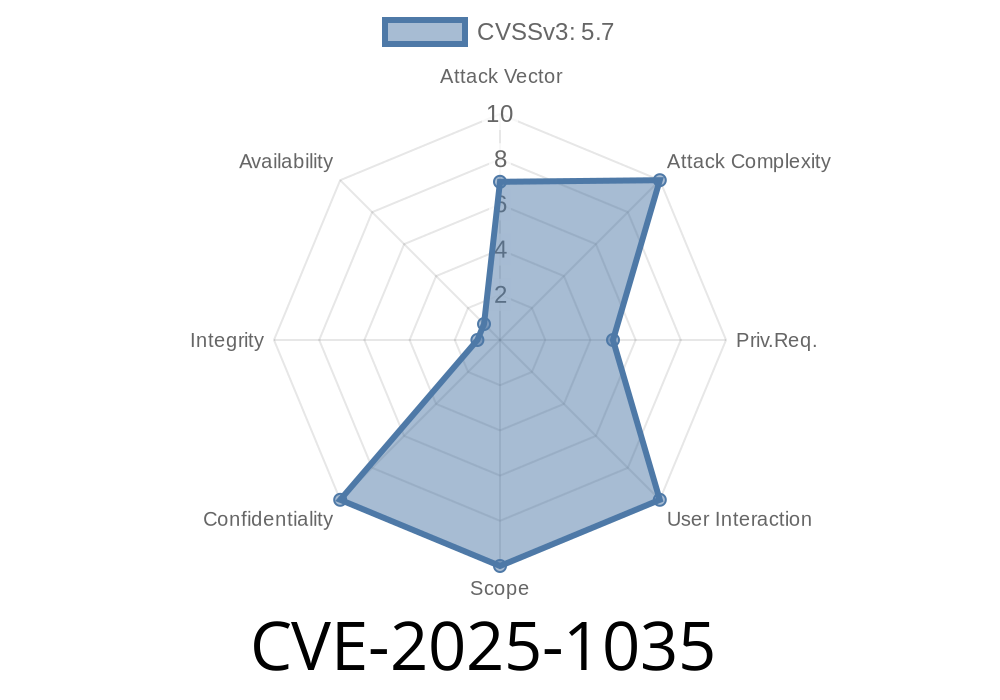*Published: 2024-06-18*
Komtera Technologies' KLog Server is a widely used log management solution. In early 2025, CVE-2025-1035 was assigned to a serious security glitch: improper limitation of pathnames, commonly known as a directory/path traversal vulnerability. This bug affects all KLog Server installations before version 3.1.1. If you use this product for managing or viewing logs, you should read this. We'll break it down, show how the bug works, how attackers can exploit it, and what you need to do.
What is CVE-2025-1035?
CVE-2025-1035 lets a remote attacker manipulate web input to trick KLog Server into reading or writing outside its intended log directory. In security speak, that's "improper limitation of a pathname to a restricted directory ('Path Traversal')."
In plain English: If an attacker can send a request containing special characters like ../, KLog Server fails to block this, so they can reach any file on the server the application has access to. That may include configuration files, credentials, or even system files.
Affected versions:
*All Komtera KLog Server versions before 3.1.1*
Most web applications allow users to access files by setting a filename in the URL. For example
http://your-klog-server/viewlog?file=2024-06-18.log
A safe application checks the user input and only allows valid log file names (without slashes or funny characters). Vulnerable KLog Server versions did not properly sanitize this input.
A bad guy can change the file parameter to "../../../../etc/passwd" (on Linux) or ..\..\..\Windows\win.ini (on Windows) to go up and read system files.
`
GET /viewlog?file=../../../../etc/passwd HTTP/1.1
`
If the server responds with the contents of /etc/passwd, it's vulnerable!
`
GET /viewlog?file=../../../klog.conf HTTP/1.1
`
This could expose sensitive credentials—the attacker can now read configuration files that were never meant to be accessible by the web.
from flask import Flask, request, send_file
@app.route('/viewlog')
file = request.args.get('file', '')
logdir = '/opt/klog/logs/'
`
The bug: There is no check to be sure file stays inside the /opt/klog/logs/ directory.
Exploit Details
The attacker doesn't need to log in or have any special access. All they need is knowledge of this bug and a way to send HTTP requests (e.g., a web browser, curl, postman).
On Linux: They can grab /etc/passwd or klog.conf
On Windows: They can grab C:\Windows\win.ini or C:\ProgramData\Komtera\KLog\klog.conf
If the file is writable (rare, but possible in poorly configured systems), they might even replace or delete files.
Much worse, if KLog logs are parsed or executed, the attacker could plant malicious code or escalate their privileges.
How to Fix
Komtera addressed this issue in KLog Server 3.1.1. The fix is simple: always sanitize user input and ensure file accesses stay within the expected directory.
import os
@app.route('/viewlog')
def view_log():
file = request.args.get('file', '')
logdir = '/opt/klog/logs/'
# get absolute path and check it's under logdir
path = os.path.abspath(os.path.join(logdir, file))
if not path.startswith(os.path.abspath(logdir)):
abort(403) # Forbid access
return send_file(path)
References
- Komtera Security Advisory KLog Patch Notes (3.1.1)
- NIST NVD CVE-2025-1035 Record
- OWASP Path Traversal Cheat Sheet
- Mitre CWE-22: Improper Limitation of a Pathname to a Restricted Directory ('Path Traversal')
Final Words
CVE-2025-1035 is a classic web application mistake that can have big impacts. If you run Komtera KLog Server, check your version and patch immediately. Don't underestimate "boring" path traversal bugs—attackers certainly don't.
If you liked this exclusive breakdown, share and stay safe!
Timeline
Published on: 02/18/2025 12:15:16 UTC
